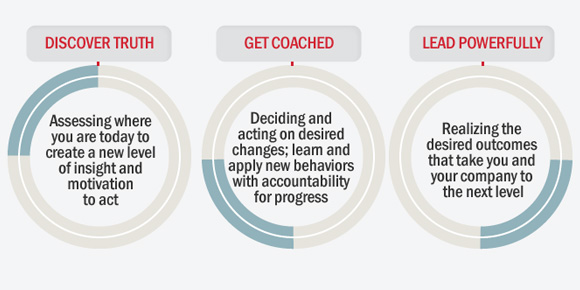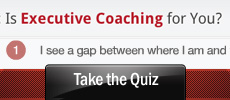
Executive Coaching offers a near six-fold return on investment.
Executive Coaching & Leadership Development

In today’s fast-paced, competitive business world, it’s no longer enough for a leader to be skilled and knowledgeable about his or her business. Also essential to success is strong and effective leadership, which has been proven to drive business performance. The absence of effective leadership doesn’t just invite sub-par performance; it endangers the bottom line.
Executives aren’t necessarily natural-born leaders. True leaders are made, not born. More and more companies are realizing the importance of leadership development by design, rather than by accident. Because of this, engaging an executive coach is a growing practice. Coaching helps executives and their teams to increase their skill and effectiveness as leaders by building self-awareness that leads to behavioral change.
What is Executive Coaching?
Simply stated, executive coaching is:
Focused behavioral change that starts with self-awareness facilitated through one-on-one (1:1) learning. As a strategic thinking partner, the executive coach helps design actions, manage progress, and provide accountability toward a pre-determined set of individual development goals that align with organizational priorities. In this role, the executive coach promotes active experimentation and self-discovery, challenges assumptions and perceptions, provides insights, and helps to identify and access different learning resources.
Why Engage an Executive Coach?
Leaders who want to take their performance and their companies to the next level will often engage an executive coach to assist them and their teams. At Arseth Insights, the coaching relationship involves:

Some of the results others have realized through coaching include:
Improved Communication – Communication is one of the most critical skills of leadership and essential to achieving results with and through others. It is not uncommon for a leader to have ineffective communication skills or practices, or to not fully comprehend the effects of poor communication on results. An executive coach can help you understand what is working and what isn’t―as well as help you create a plan and hold you accountable for improving your communication impact.
Enhanced Decision-Making – The best decisions are those made as expediently and objectively as possible—and these decisions come from having the right information and people involved at the right time. An executive coach can help you identify and act on new approaches that will make you or your organization’s decision-making more effective.
Improved People Management Skills – One of the most commonly missing skills at every level of leadership is the ability to manage people: setting clear expectations, providing feedback and coaching for development, holding employees accountable for results, and building a high-performing team. Executive coaching can help you address performance issues that may be impacting results and enable you to manage people more effectively in order to engage their best effort.
Improved Influence and Collaboration Skills – In today’s business climate, the ability to influence is becoming an increasingly important leadership skill. Whether you need key decision-makers to support a strategy of action, peer organizations to support your team when they are already being pulled in multiple directions, or your leadership team to be highly engaged in a new initiative, influence and collaboration are the skills required. Executive coaching can help you develop or hone these critical competencies.
Reduced Career-Limiting Behavior – Let’s face it―many of us have adopted behaviors or practices over the course of our careers that don’t always serve us well. Executive coaching can help you recognize and develop strategies for replacing unproductive or career-limiting behaviors with more effective ones.
The Benefits of an Executive Coach
Leaders and their organizations who have engaged an executive coach report the following benefits:
- Retention of high performers
- Improved financial returns
- Higher employee satisfaction and engagement
- Increased innovation
- Improved decision-making
- Increased candor and dialogue
- Development of a leadership bench
Most people can perform at much higher levels than they currently do. But what people think they do is often different from what they actually do. The biggest obstacle to performance is not that people don’t KNOW how to ACT―it’s that people don’t ACT on what they KNOW.
Ready to take it up a notch?
Contact Suzann today for a complimentary consultation.


 Suzann helped coach me through a couple of difficult management issues. She is someone who I feel comfortable pushing back on as well as someone I feel I could depend on for solid, proven advice. Anyone who is thinking about hiring a coach should certainly consider working with Suzann.”
Suzann helped coach me through a couple of difficult management issues. She is someone who I feel comfortable pushing back on as well as someone I feel I could depend on for solid, proven advice. Anyone who is thinking about hiring a coach should certainly consider working with Suzann.”